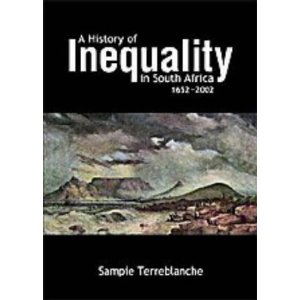
Professor Sampie Terreblanche, academic, writer and Professor emeritus of Economics at Stellenbosch University, recently presented a series of lectures at Rhodes in conjunction with the Andrew W. Mellon Foundation.
Perhaps most well-known for his seminal work, A history of inequality in South Africa, 1652 – 2002 (2003), Prof Terreblanche has lectured and published extensively on economic history and economic systems and has been affiliated to Stellenbosch University for 50 years, first as a student and then as lecturer. The titles of his talks at Rhodes included, “The controversy of the rise of the West since 1500”, “The contribution ‘undemocratic’ capitalism has made (and is still making) to the growing inequality in the domestic and international distribution of finance,” and “The monopolisation of industrialisation for 200 years (1770 - 1970) by the West and the sharp increase in the unequal international distribution of income”.
In considering the “great income difference between the rich north and the poor south”, Prof Terreblanche highlighted certain factors which have contributed to the rise of the west over what he dubbed, the “restern world”, focusing mainly on the period of industrialisation in Europe.
Prof Terreblanche defined “the west” as comprising of predominantly white, European, Christian western societies that are capitalistic by nature, wealthy and industrialised, and the “rest” as predominantly black and brown, non European, non Christian, unindustrialised societies. According to Prof Terreblanche, it was only after the period of industrialisation in Europe in 1820 that grave disparities in wealth between the west and the rest began to occur. Between 1820 and 1950 there was a dramatic decline in the share of capital of the rest and a dramatic increase in that of the west’s. According to Prof Terreblanche, in the years between 1777 and 2003 the per capita income of the west rose more than 25 times, whereas that of the rest’s rose less than seven times, and Africa’s less than three. Whereas in 1750 the rest produced 75% of the relative share in total world manufacturing output, this percentage dropped dramatically with the onset of the industrial revolution.
In considering the various phases of global economic dominance, Prof Terreblanche provided an overview of six phases since 1750, which included periods of dominance by Britain (1750 to 1880), Germany and America (1880 to 1913), America (1913 to 1953), American based transnational corporations (1953 to 1980) and western transnationals (1980 to 2000), highlighting the trend of Americanisation in the global economic sphere. Until the granting of deregulation and privatisation of transnational corporations in 1981, “For the first time in history the wild horse of capitalism had a rider to tame it. Then transnational corporations were set free to gallop all over the world and cause havoc in many countries,” Prof Terreblanche said.
For Prof Terreblanche, the new liberal capitalism was facilitated by various partnerships between America and certain actors, including China for capital and technology, and India for cheap labor. Although it has secured the west as the global economic actor, the process of industrialisation hasn’t come without a price to humanity at large. While between 1850 and 1980 the majority of the workplaces in the world were safe, workers in today’s world are exposed to inhumane conditions, where practices “have shifted back to where they were before”. “It’s a shame that the western world is involved with conditions where human rights are so neglected, as is the case in many factories in China and India,” said Prof Terreblanche.
He also highlighted the role Christianity has played in justifying and sustaining processes of westernisation, saying: “Imperialism and capitalism couldn’t have survived in the western world without the support and justification of Christianity.”
Prof Terreblanche studied at the University of Stellenbosch (MA, Dphil) and at Harvard (1968-1969) and lectured for eight years at the University of the Orange Free State. He has been connected to Stellenbosch University for almost fifty years, first as a student and then as lecturer. He was professor of Economics at Stellenbosch from 1968 until his retirement in 1995. Since then he has lectured in a part-time capacity. Prof Terreblanche was involved in clandestine meetings with the ANC at the end of the 1980s. In 1985 the members of staff of Stellenbosch founded the "Discussion group '85" of which he became the chairman. They felt that the South-African government was on the wrong track. He ended his membership of the National Party in 1987 and became one of their strongest critics. He was a founding member of the Democratic Party (now Democratic Alliance) and its first economic adviser, but is now no longer active in party politics. He has published a considerable number of articles in local and international newspapers and journals.
Story by Sarah-jane Bradfield
